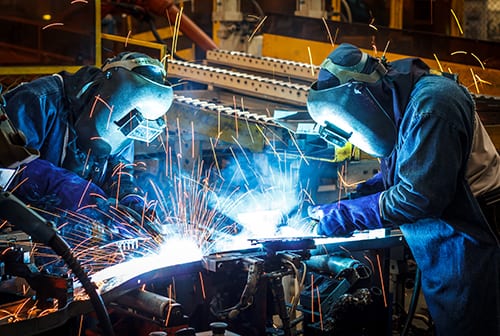 The production industry has been booming in recent years, but with such rapid growth and a large number of seasoned employees reaching retirement, many companies are experiencing a manufacturing labor shortage.
The production industry has been booming in recent years, but with such rapid growth and a large number of seasoned employees reaching retirement, many companies are experiencing a manufacturing labor shortage.
The worry for manufacturing professionals is that the number of open jobs will continue to exceed the number of qualified applicants looking for work, creating a significant skills gap. This hinders a company’s ability to maintain or increase production levels to meet consumer demand, ultimately resulting in delayed orders, decreased revenue and lost customers.
So, why is there a skills gap? Generational trends are partly to blame. While many Baby Boomers pursued trade or vocational jobs, Generation X, Millennials and Generation Z have tended to focus more on a college education and apply for white-collar jobs. Plus, it doesn’t help that manufacturers are competing for technical talent with other industries, such as finance and retail.
However, there is light at the end of the tunnel. Keep reading to learn how producers can survive the manufacturing labor shortage.
8 ways for companies to tackle the manufacturing labor shortage
- Partner with educational institutions. Even though the manufacturing industry is becoming more technology-focused in areas like the Industrial Internet of Things (IIoT), machine learning and robotics – areas that tend to attract the next generation of workers – young professionals don’t seem to view manufacturing as a desirable career path. This is where it can be helpful to invest in the future workforce by providing young people with early exposure to STEM fields (science, technology, engineering and mathematics). By providing extra learning opportunities through high schools, vocational schools and colleges, companies create a direct recruitment line for easy access to a talent pool. Additionally, companies can set up apprenticeship programs or help finance potential candidates’ cost of tuition or certifications.
- Offer short-term job assignments for non-STEM applicants. This gives workers the chance to test the waters and see if they like a certain field. This contract situation also helps companies get insight into employees before giving them permanent status.
- Offer in-house training and apprenticeships. One of the simplest ways to increase the number of skilled workers is by training new and existing employees. Educating existing workers provides them with upward mobility, inspiring them to stay on staff while also freeing up entry-level jobs for less skilled workers.
- Embrace automation. It helps to automate unfavorable, routine and sometimes dangerous processes, such as palletizing, wrapping and shelving. Investing in this approach has multiple benefits, from improving the precision of manufacturing tasks and workplace safety, to reducing inefficiencies.
- Tap into unconventional talent pools. For example, individuals with a strong skillset who are oftentimes overlooked are veterans. Additionally, rehabilitated ex-convicts sometimes re-enter the workforce.
- Offer modern incentives. Some manufacturers are beginning to offer more flexible schedules, shorter work weeks and work-from-home opportunities (depending on the job). Little things that seem simple can also make a difference, such as installing ergonomic chairs and flooring that’s easier on joints. A solid financial package, generous vacation time and stock purchase options are also worth considering.
- Promote a positive brand image. It’s important for the work manufacturers do to be perceived as interesting, rewarding, clean, safe, stable and secure. Putting extra focus on the value of people is also key.
- Turn to analytics. Manufacturers can analyze demographic factors, such as graduation rates and living costs, across the country to find the best talent. This helps companies be more proactive in their search for candidates.
Related posts
New product introduction | 8 ways to accelerate NPI, reduce time to market
Industrial Internet of Things (IIoT): Connected tech revolutionizes manufacturing